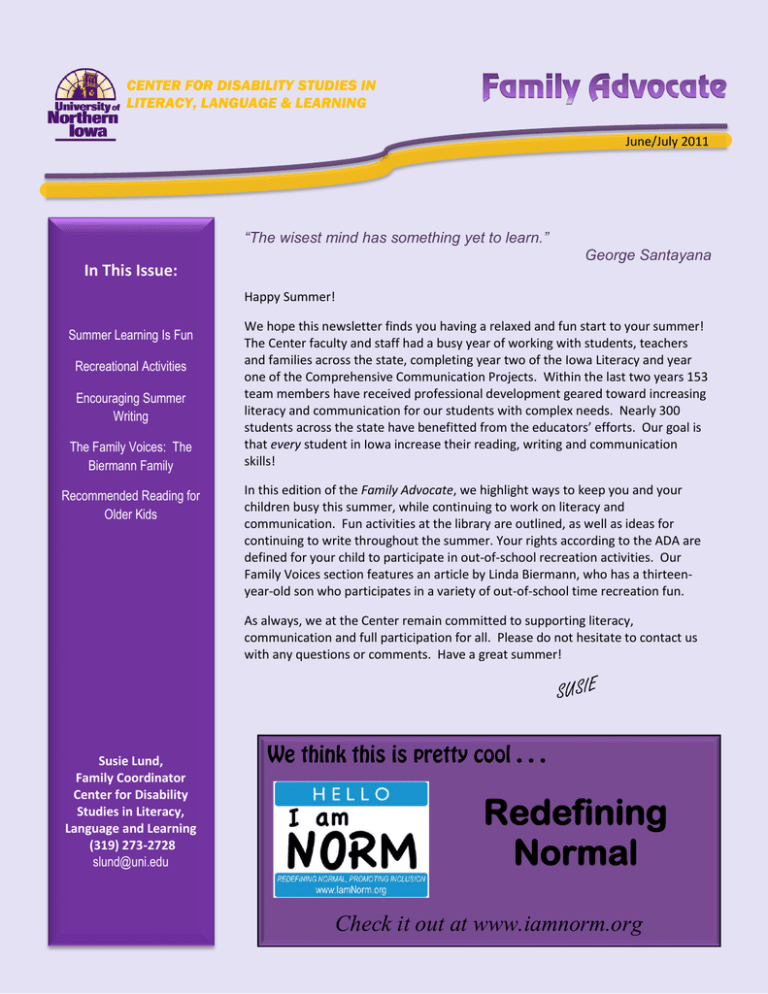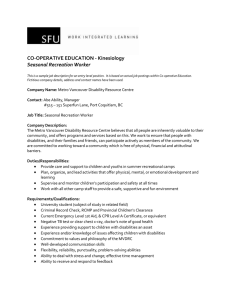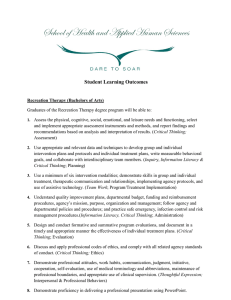Document 12860741
advertisement

CENTER FOR DISABILITY STUDIES IN LITERACY, LANGUAGE & LEARNING June/July 2011 “The wisest mind has something yet to learn.” George Santayana In This Issue: Happy Summer! Summer Learning Is Fun Recreational Activities Encouraging Summer Writing The Family Voices: The Biermann Family Recommended Reading for Older Kids We hope this newsletter finds you having a relaxed and fun start to your summer! The Center faculty and staff had a busy year of working with students, teachers and families across the state, completing year two of the Iowa Literacy and year one of the Comprehensive Communication Projects. Within the last two years 153 team members have received professional development geared toward increasing literacy and communication for our students with complex needs. Nearly 300 students across the state have benefitted from the educators’ efforts. Our goal is that every student in Iowa increase their reading, writing and communication skills! In this edition of the Family Advocate, we highlight ways to keep you and your children busy this summer, while continuing to work on literacy and communication. Fun activities at the library are outlined, as well as ideas for continuing to write throughout the summer. Your rights according to the ADA are defined for your child to participate in out-of-school recreation activities. Our Family Voices section features an article by Linda Biermann, who has a thirteenyear-old son who participates in a variety of out-of-school time recreation fun. As always, we at the Center remain committed to supporting literacy, communication and full participation for all. Please do not hesitate to contact us with any questions or comments. Have a great summer! Susie Lund, Family Coordinator Center for Disability Studies in Literacy, Language and Learning (319) 273-2728 slund@uni.edu Redefining Normal Check it out at www.iamnorm.org 2 If it has been a while since you visited the public library, this summer would be a great time to begin! Here are some ideas of things to do at the library with your child: Join the Summer Reading Program! Youth departments typically have a summer reading program geared toward enticing children to visit the library once a week. These programs will feature fun activities, crafts and incentives to READ! Check out Books! At a recent Disability Studies in Education (DSE) conference, Donna S. Wakefield PhD, from National College of Education at National-Louis University, recommended high quality literature, which includes children with disabilities in a natural way. The following books were recommended: o Picture books depicting disability naturally: Hooway for Wodney Wat, by Helen Lester, 2003, Sandpiper I Can, Can You? by Marjorie W. Pitzer, 2004, Woodbine House It’s OK to be Different, by Todd Parr, Little, Brown Books for Young Reader Keeping Up With Roo, by Sharlee Glenn, Putnam Juvenile Moses Goes to School, by Isaac Millman, 2000, Farrar, Straus and Giroux Mr. Worry by Molly Niner, Albert Whitman & Company Sit Still! by Nancy Carlson: Picture Puffin Books Susan Laughs, by Jeanne Willis, 2000, Henry Holt and Co. Thank You, Mr. Falker, by Patricia Polacco, 2001, Philomel When Sophie Gets Angry, by Molly Bang, Scholastic For a complete list of recommended books visit: http://www.donnawakefield.com/Disability_in_Literature.html) Use the Computer! Many websites exist that support literacy and communication for children. The following websites are recommended by the Center: o Tarheel Reader: www.tarheelreader.org This website features a collection of free, easy-to-read, and accessible books on a wide range of topics. The books may be downloaded as slide shows in PowerPoint, Impress, or Flash format. o Tumblebooks: an online collection of books, this animated, talking picture books website teaches kids the joy of reading in a format they'll love. TumbleBooks are created by adding animation, sound, music and narration to existing picture books in order to produce an electronic picture book that you can read, or have read to you. The TumbleBook Library collection is accessed online from every computer in your library with Internet connection, or from home through a direct link on your school or library website. o Arthur: http://pbskids.org/arthur/index.html If you enjoy Arthur books, this website has opportunities to play games and write stories and comic strips about Arthur. o Kids at Random: http://www.randomhouse.com/kids/favorites/ Whether your child enjoys Junie B. Jones, Magic Tree House, or Dr. Seuss, this website features games, activities and books about your children’s favorite characters. o Dinosaurs: http://teacher.scholastic.com/activities/dinosa urs/ for children who love dinosaurs, this website presents opportunities to read facts, play games and write stories about dinosaurs. For a list of other media depicting disability naturally see: http://disabilitystudies.syr.edu/resources/otherdi sabilityresources.aspx#media Disability is Natural www.disabilityisnatural.com Inclusion Connection www.inclusionconnection.org Museum of Disability http://www.museumofdisability.org 3 Recreation Activities: What makes your child smile? What is he good at? What does she enjoy doing in her spare time? What recreation activities offered throughout the community would he enjoy? The Americans With Disabilities Act of 1990 (ADA), guarantees full and equal enjoyment of the goods, services, facilities advantages or accommodations for any person who uses a place of public accommodations (i.e. a park, zoo, amusement park, or other place of recreation; a gymnasium, health spa, bowling alley, golf course, or other place of exercise or recreation.) This means that any program offered by a recreation agency in your area is required to be accessible and usable to all people, including your child, who may have a disability. It can be overwhelming to begin a writing project without any parameters or framework. Here are some simple tips to spark the creative process. Photograph items & make them into postcards to send to family or classmates that you may not see often during the summer months to describe vacation activities. Together We Play (TWP) is part of the nonprofit Inclusion Connection. TWP’s goal is to assist recreation agencies towards including everyone in their activities. Through professional development for agencies and onsite consultation, this program’s focus is to train local recreation programs to include all children in their programming. For more information on inclusive recreation, contact Inclusion Coordinator, Ryan Laudick, of Together We Play at: laudick.ryan@gmail.com 319-883-1241 Write a grocery list, then go to the store and purchase the items-don’t forget popsicles! Use a picture of something funny and write about it. Read a story and write about your favorite part. Write together with a parent or friend: http://www.nwp.org/cs/public/print/doc/res ources/write_together.csp Artifact Activity: find something that “reveals something of your child’s personality or identity.” Then write ideas, words or feelings that come to mind when you think about the item. Map Activity: Draw a map of the neighborhood, labeling places you think are important. Keep a Travel Log for a vacation to share with your classmates when you return to school in the fall. Become an Author – Publish a book on the 4 My name is Linda Biermann. My husband and I, along with our three children, live on our family farm in rural Tripoli. When I speak of special education, it is from a very personal perspective, as my middle child, Michael, was born with Down syndrome. Michael has received special education since he was an infant. From the time of Michael’s birth, my husband and I have made great efforts to avoid the tendency for others to label our son. Michael was indeed born with a diagnosis, but that in no way identifies the individual that he is. Our greatest lesson of what to expect, or not to expect from Michael, came from Michael himself when he was only a few weeks old. At the time of Michael’s birth, there were several complications that necessitated him staying in the hospital for several weeks. A well-meaning doctor took us aside to inform us of all that we would face with our new son. Among the warnings, the doctor explained that Michael was mentally retarded and would be incapable of breastfeeding. Throughout my pregnancy, I planned to breastfeed our new son, just as I had with our eldest son. I never considered any other possibility. In the hospital, Michael was tube fed breast milk. I had attempted to nurse with no success, but believed in time that he would catch on. After many days of frustrating attempts, we learned that in order to take Michael home he needed to be successfully feeding. Finally, exhausted and overwhelmed, I conceded that my son was incapable of breastfeeding because he had Down syndrome. He began to take a bottle that day, and was able to come home. Soon after settling in, my wise husband gently suggested I try again. He knew how disappointed I felt in not being able to breastfeed Michael. I was resistant at first, primarily because I feared that I might have to admit that the doctors were correct and my son was mentally retarded. One quiet day, however, I attempted once again. Within seconds, Michael was nursing as though he’d been doing it since birth. I was elated! I believed that Michael could not breastfeed because he had Down syndrome. Michael had proved me wrong! Michael taught me that he did not breastfeed initially because his modest mother was attempting to do so in a crowded hospital nursery with other mothers and fathers surrounding her. He could not breastfeed because he was premature and a sick, weak little baby, recovering from significant surgery. You may ask why this matters. It matters because it’s important to recognize, this meant more than a simple manner of feeding my baby. This was the first step to a slippery slope of acknowledging that everything the experts had told me about my newborn son was correct. This was the first in a series of limitations I 5 would place on my son, based on something someone else had told me about him. But Michael wouldn’t have it. He showed us to never, ever underestimate him. Michael lives in a world where underestimating him is more the norm than not. I very nearly sold my son short. He taught me never, ever to make that mistake again. From that day forward, I have never made the mistake of assuming that he is incapable of anything. My husband and I often say of all our children, that we expect they can do absolutely anything and accept whatever they do. We often face stereotypes that will no doubt follow Michael throughout his life. Because Michael has Down syndrome, he has been classified as mentally retarded. This label causes people to assume that Michael is incapable. It is true that learning is at times more difficult for Michael than the majority of his peers. However, I believe that every child learns differently from the next. Michael learns differently, but he does indeed learn. He has areas of strength and areas of weakness. One thing is clear: Michael is capable of learning anything. Today, Michael is a thirteen year old, typical kid. He is included with his peers in general education for all but one period a day in junior high. He plays soccer and basketball with his typical classmates and enjoys fishing and camping in the summer time. Accomplishing this inclusion hasn’t always been without challenges. At times we have coasted. Other times it has seemed to be an insurmountable hill. We’ve gone as far as exercising our right to dispute resolution under the Individuals with Disabilities Education Act. We are committed because Michael needs to be able to function just as you and I function if he is to be master of his own destiny. 6 Sharing the Joys One of our Center’s objectives is supporting parents’ efforts in advocating for their children. Recent research in the field of social work has begun to focus on how families succeed rather than on how they fail. There is a need for research that looks at the positive and joyous aspects of parenting a child with disabilities. Keeping this in mind, we want to hear from you! What are the joys that you get to experience as a result of having a child with a disability? Please email your stories to slund@uni.edu so that we may feature you in future Family Advocate Newsletters. RECOMMENDED READING FOR OLDER KIDS The following are for reading to your child (or for independent readers at 2-5th grade level) 1. Fantasy Roald Dahl books such as Matilda, Charlie and the Chocolate Factory, The BFG 2. Animals/Adventure Gary Paulsen books such as My Life in Dog Years, Hatchet, etc. For Independent Readers 1. My First Graphic Novels (series by Capstone Press)- The Kickball Kids, Goalkeeper Goof, etc. 2. Mo Willems books Elephant and Piggie,or Don't Let the Pigeon Drive the Bus 3. Magazines Sports Illustrated for Kids, Ranger Rick, National Geographic for Kids 3. Fun Reading Diary of a Wimpy Kid 4. Series Magic Treehouse, Boxcar Children, Nate the Great The Center for Disability Studies in Literacy, Language and Learning was established in December 2009, as a collaborative effort of five faculty members with research interests and expertise in working with children with significant disabilities Faculty Members: Dr. Evette Edmister is an Assistant Professor of Communication Sciences and Disorders at UNI. Dr. Jennifer Garrett is an Assistant Professor of Communication Sciences and Disorders at UNI. Dr. Chris Kliewer is a Full Professor in the Department of Special Education at UNI. Dr. Amy Petersen an Assistant Professor in the Department of Special Education at UNI. Dr. Amy Staples is an Associate Professor in the Department of Special Education at UNI. - Supporting Team Members: Grad Assistants – Assist with data collection and analysis and help develop AAC devices. Susie Lund – Family Coordinator Beth Huber – Researcher - - Tricia Frericks – SLP/Clinical Supervisor - Lora Hickman – Program Coordinator - Jen King – Communication & Mktg Specialist - AT/SLP Support Personnel





